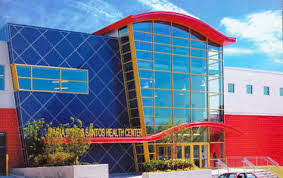Community Care, Stronger Together by Sarah Hodapp
After we knocked on our supervisor’s office door, Kim and I, who serve as Care Navigators at Maria de Los Santos Health Center, patiently stood outside, skimming our notes one last time before an important meeting with the team leaders. Soon thereafter, the door swung open. The small office was packed and we tried to enter without drawing too much attention to ourselves. As I began to shut the door behind me, I noticed many tear-stained faces in the room. I hesitated for a moment, thinking that perhaps we had come at the wrong time and should excuse ourselves. These thoughts must have been apparent in my expression, as just then, one of the team leaders motioned for me to shut the door and remarked, “it’s okay, come on in."
It had not been quite a week since Hurricane Maria had devastated much of Puerto Rico. Maria de los Santos, a Health Center located in North Philadelphia, provides care for a primarily Latino population. Many of the employees here are a part of the community served by the health center, which includes a high number of Puerto Ricans. Kim and I were the only ones in that room who had no familial ties to PR. Before starting the meeting, we sat quietly for thirty minutes, listening to the fears and feeling the emotions that many staff members had been holding in for the last few days. I couldn’t even begin to imagine how I would feel if it was my own family stranded out there. The idea of not being able to get in contact with my family, nor knowing whether or not they and their homes were safe, was a heavy and scary thought.
Later that day, when Kim and I returned to our own office, we reflected on what we had witnessed. We were grateful that our staff had taken the time to decompress by sharing their emotions and that they had let Kim and me be part of such a raw and humbling interaction. We knew it was our responsibility to take notice of the effects the hurricane was having on our patients. As Care Navigators, we focus on cancer outreach. During a typical day, we call patients into our office to educate them on different types of cancers, the recommended screenings, and preventive measures they should take. Starting that week, and still today, we make sure we are responsive to patients’ mental state, recognizing the effects of Hurricane Maria or of whatever silent storm they may be weathering.
When Kim and I take the time to connect with patients and show them that we care, beyond only trying to explain to them why they need a pap smear or a colonoscopy, we notice a benefit to patients’ mental health as well as to their motivation to take charge of their own physical health. When coming in for an appointment, a patient is inherently vulnerable; they must divulge intimate details about their body, lifestyle and overall health to their provider. By sharing this information, providers are able to make more accurate and thorough assessments of the patient’s health. Therefore, it is the responsibility of health center staff to be open and empathetic towards patients in order to create strong, community-based care that can carry patients through their hardships and ultimately lead to healthier lives.